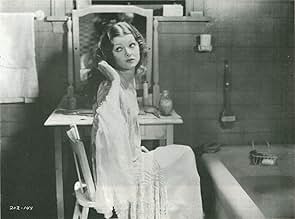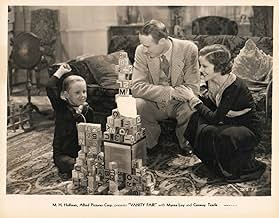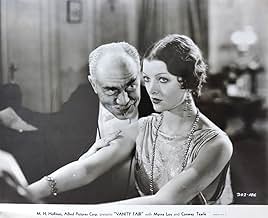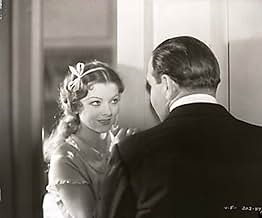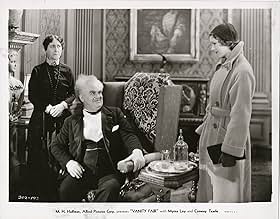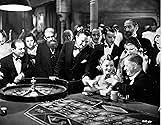Adicionar um enredo no seu idiomaThis cinematic adaptation of William Makepeace Thackeray's novel stars Myrna Loy in her first starring role.This cinematic adaptation of William Makepeace Thackeray's novel stars Myrna Loy in her first starring role.This cinematic adaptation of William Makepeace Thackeray's novel stars Myrna Loy in her first starring role.
- Direção
- Roteiristas
- Artistas
Ray Culley
- Casino patron
- (não creditado)
Bill Elliott
- Minor Role
- (não creditado)
Tom Ricketts
- Sir Pitt's Butler Parker
- (não creditado)
- Direção
- Roteiristas
- Elenco e equipe completos
- Produção, bilheteria e muito mais no IMDbPro
Avaliações em destaque
Myrna Loy is cast as Becky Sharp, and this appears to be her first starring role, a step away from the exotic vampires she played earlier in her career (such roles would continue through 1934, even after her breakthrough role in THE THIN MAN), but it would be Frank Capra and W.S. Van Dyke who would reimagine her as what she was: a great American beauty.
Miss Loy was lent from MGM to M.H. Hoffman at Chesterfield for this modern-dress version of Thackeray's novel, and despite the cheapness of the production and the wonky soundtrack on the copy I saw, director Chester Franklin's desire to make a serious version of the story about the girl who knew men only wanted her for one thing, and she was going to make them pay for it, shines through. The casting includes some good silent movie talent, including Conway Tearle as Rawdon Crawley, able to support a leading lady without distracting the audience; Lionel Belmore as his lascivious father;Barbara Kent as her friend, Amanda Sedley.
It's a nice version, and undoubtedly was a turning point in Miss Loy's career. Unfortunately, Franklin's polite and family-friendly handling failed to ignite any major response in a year when movie grosses and profits were at a low point; and the sumptuous Technicolor version of 1935 all but erased this movie from the public consciousness.
Miss Loy was lent from MGM to M.H. Hoffman at Chesterfield for this modern-dress version of Thackeray's novel, and despite the cheapness of the production and the wonky soundtrack on the copy I saw, director Chester Franklin's desire to make a serious version of the story about the girl who knew men only wanted her for one thing, and she was going to make them pay for it, shines through. The casting includes some good silent movie talent, including Conway Tearle as Rawdon Crawley, able to support a leading lady without distracting the audience; Lionel Belmore as his lascivious father;Barbara Kent as her friend, Amanda Sedley.
It's a nice version, and undoubtedly was a turning point in Miss Loy's career. Unfortunately, Franklin's polite and family-friendly handling failed to ignite any major response in a year when movie grosses and profits were at a low point; and the sumptuous Technicolor version of 1935 all but erased this movie from the public consciousness.
When I first turned on the DVD with this film, I was very tempted to just turn it off--the print and especially the sound were that bad. In fact, it's among the worst quality prints I've ever seen from Alpha Video--and that's saying a lot because none of Alpha's DVDs appear to have any restoration work on them and many are in horrible shape. The sound on this one is simply appallingly bad and I sure hope someone would one day restore the print. But, considering this isn't a particularly good film, it's doubtful this will occur.
Aside from the novelty of seeing this story of a conniving woman set in the modern day instead of the 19th century like it was in Thackeray's novel as well as seeing Myrna Loy in one of her earliest starring roles, there's not much to recommend this movie. While I did not exactly love the famous 1935 version (entitled "Becky Sharp"--and it was the first full-length full color movie), it was better than this one. There are also newer versions that also work better than this low-budget 1932 one. In fact, I really think they set the film in the 1930s because of the budget--as they didn't need the added expense of costumes and wigs. This one, unfortunately, comes off as dated and creaky--with poor acting and a cheapness about it. And, given the horrendous quality of the print, it is not a film I could recommend.
Aside from the novelty of seeing this story of a conniving woman set in the modern day instead of the 19th century like it was in Thackeray's novel as well as seeing Myrna Loy in one of her earliest starring roles, there's not much to recommend this movie. While I did not exactly love the famous 1935 version (entitled "Becky Sharp"--and it was the first full-length full color movie), it was better than this one. There are also newer versions that also work better than this low-budget 1932 one. In fact, I really think they set the film in the 1930s because of the budget--as they didn't need the added expense of costumes and wigs. This one, unfortunately, comes off as dated and creaky--with poor acting and a cheapness about it. And, given the horrendous quality of the print, it is not a film I could recommend.
I love the Thackeray novel on which this film is based. And while this modern version of Becky Sharp's story is a B film, the casting of Loy, in her first top-billed role, is rather fascinating.
Before Loy became MGM's reigning good girl in scores of genteel and comic roles, she was an actress. VANITY FAIR was Loy's follow-up film to EMMA, in which she played a snotty and greedy daughter who almost destroys the loyal housekeeper (Marie Dressler).
Loy's Becky is much nastier than Miriam Hopkins' version 3 years later in BECKY SHARP. Loy's Becky is very much a pre-Code film character with her plunging necklines and amoral ways. It's the type of character that Jean Harlow or Clara Bow could easily have played, but Becky here is still supposed to be of the genteel set. That's what makes her fallen character so tragic.
In counterpoint to Loy's grasping Becky is the goody goody Amelia (Barbara Kent) who is just not an interesting character. Mary Forbes is icily good as Mrs. Sedley. Most of the other actors in this version are pretty blah: Conway Tearle as Rawdon; Walter Byron as Osborne; Anthony Bushell as Dobbin. Others are nearly Dickensian is their quirkiness: Billy Bevan as Joseph; Lionel Belmore as Crawley; Montagu Love as the Marquis; Lilyan Irene as Polly the maid; Elspeth Dudgeon as the housekeeper.
Loy is front and center throughout. While the ending is rather shocking, she has several excellent scenes, such as the gambling scene in the casino where she tries to steal another woman's winning roulette bet. The more Loy's Becky descends morally, the more beautiful she gets until she is finally "caught." Bottom line here is that this is a very solid performance by Loy in a film that should be seen.
Before Loy became MGM's reigning good girl in scores of genteel and comic roles, she was an actress. VANITY FAIR was Loy's follow-up film to EMMA, in which she played a snotty and greedy daughter who almost destroys the loyal housekeeper (Marie Dressler).
Loy's Becky is much nastier than Miriam Hopkins' version 3 years later in BECKY SHARP. Loy's Becky is very much a pre-Code film character with her plunging necklines and amoral ways. It's the type of character that Jean Harlow or Clara Bow could easily have played, but Becky here is still supposed to be of the genteel set. That's what makes her fallen character so tragic.
In counterpoint to Loy's grasping Becky is the goody goody Amelia (Barbara Kent) who is just not an interesting character. Mary Forbes is icily good as Mrs. Sedley. Most of the other actors in this version are pretty blah: Conway Tearle as Rawdon; Walter Byron as Osborne; Anthony Bushell as Dobbin. Others are nearly Dickensian is their quirkiness: Billy Bevan as Joseph; Lionel Belmore as Crawley; Montagu Love as the Marquis; Lilyan Irene as Polly the maid; Elspeth Dudgeon as the housekeeper.
Loy is front and center throughout. While the ending is rather shocking, she has several excellent scenes, such as the gambling scene in the casino where she tries to steal another woman's winning roulette bet. The more Loy's Becky descends morally, the more beautiful she gets until she is finally "caught." Bottom line here is that this is a very solid performance by Loy in a film that should be seen.
A ruthless young woman uses her feminine wiles to climb the social ladder. A pre-Code updating of Thackeray's famous satirical novel features an enjoyable performance from a young Myrna Loy, who looks ravishing as the scheming opportunist Becky Sharp, a woman more than willing to throw friendship aside in her pursuit of wealth. It's a little too episodic to be successful, but there's something strangely endearing about the way Sharp accepts each setback with uncomplaining stoicism.
Rather affecting little morality flick adapted from the classic novel of same name. Wow, Becky Sharp is one sharp looking cookie. As Becky, Loy turns every rich guys head into a hormonal surge. Trouble is she's got no moral principles that might guide her into something other than a mercenary direction. As a result, she looks to fleece potential suitors just for her own benefit. Still, she's having trouble sorting through the wealthy pursuers, who are a crowded lot. At the same time, her mis-judgements and maybe cosmic fate keep getting in the way.
Loy's perfect in her first starring role, big eyed, statuesque, and nicely modulated in her coyness. In fact, it cleverly takes a while to figure out she really is a gold-digger and not just an attention-getter. Then too, I love the way she never answers a bedroom door except in her robe-less nightgown. No wonder the guys keep coming. But Loy's real performance triumph is not making Becky dislikable despite her unremitting selfishness. To me, that helps make the movie watchable. But don't look to the storyline for action or real suspense. Rather, the plot hinges on character and what the goldigger's outcome will be. Then too, I found the climax rather surprising, but then it is 1932 while censorship is still two-years away.
Anyway, for fans of Loy, it's a showcase, while for movie fans, the 60-minutes is surprisingly contemporary in its dealings.
Loy's perfect in her first starring role, big eyed, statuesque, and nicely modulated in her coyness. In fact, it cleverly takes a while to figure out she really is a gold-digger and not just an attention-getter. Then too, I love the way she never answers a bedroom door except in her robe-less nightgown. No wonder the guys keep coming. But Loy's real performance triumph is not making Becky dislikable despite her unremitting selfishness. To me, that helps make the movie watchable. But don't look to the storyline for action or real suspense. Rather, the plot hinges on character and what the goldigger's outcome will be. Then too, I found the climax rather surprising, but then it is 1932 while censorship is still two-years away.
Anyway, for fans of Loy, it's a showcase, while for movie fans, the 60-minutes is surprisingly contemporary in its dealings.
Você sabia?
- CuriosidadesShot in ten days.
- Citações
Joseph Sedley: Ever been to Brighton?
Becky Sharp: Brighton? No, never.
Joseph Sedley: How would you like to come with me for a weekend?
[lecherous wink]
Joseph Sedley: Lovely place. Lots of fun. Lots of champagne.
- ConexõesReferenced in Hollywood Hist-o-Rama: Myrna Loy (1961)
Principais escolhas
Faça login para avaliar e ver a lista de recomendações personalizadas
Detalhes
- Tempo de duração
- 1 h 18 min(78 min)
- Cor
- Proporção
- 1.37 : 1
Contribua para esta página
Sugerir uma alteração ou adicionar conteúdo ausente

